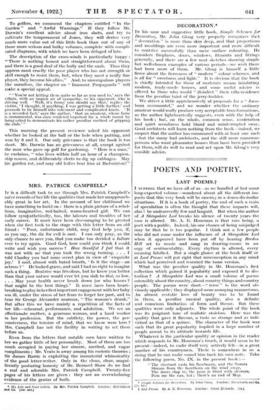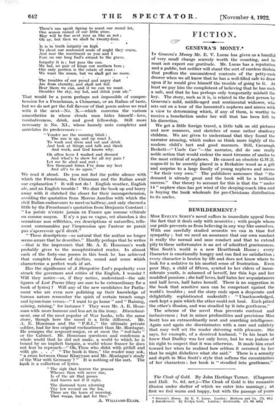POETS AND POETRY.
LAST POEMS.f I SUPPOSE that we have all of us—as we handled at last some long-expected volume—wondered about all the different im- pacts that this very book will be causing in a dozen dissimilar situations. If it is a book of poetry, the end of such a train
of speculation is often the thought that these impacts will, alas 1 be undeservedly few and languid. But when the author of A Shropshire Lad breaks his silence of twenty years the
case is altered. Mr. A. E. Housman is that rare being, a poet with a public. Indeed, his one chance of being misjudged may be that he is too popular. I think not a few people.
who did not come under the influence of A Shropshire Lad
when it appeared have been put off by hearing Bredott Hill set to music and sung in drawing-rooms in an orgy of sentimentality. Every rhythm is altered, every meaning falsified. But a single glance at the book itself or at Last Poems will put right that misconception in any mind which had perceived and resented the tame version.
What was the peculiar quality in Mr. Housman's first collection which gained it popularity and exposed it to dis- tortion ? A Shropshire Lad was a small volume of poems ostensibly about the country, about country things and country people. The poems were short—" terse " is the word ob- viously applicable ; they displayed some annoying mannerisms.
An almost ecstatic love of beauty was to be found in them, a peculiar musical quality, also a definite and conscious limitation of form and theme. But these qualities were only adjuncts. The whole point of the book was its poignant tone of realistic stoicism. here was the quality that gave it flavour, a taste as strange and as indi- vidual as that of a quince. The character of the book was such that its great popularity implied in a large number of people assent to its attitude towards life.
Whatever is the particular quality or opinion in the reader which responds to Mr. Houseman's touch, it would seem to be present—indeed, to make itself very actively felt—in a great number• of his countrymen. There is somewhere in us a string that he can make sound him back his own note. Take the following poem, No. IX. in the present book :-
" The chestnut casts his flambeaux, and the flowers Stream from the hawthorn on the wind away, The doors clap to, the pane is blind with showers. Pass me the can, lad ; there's an end of May.
• Simple Schemes for Decoration. By John Gloag. London : Duckworth and Oa Us. 65.7 t Last Poem. By A. E. Housman. London: Grant Richards. tae.]
There's one spoilt Spring to scant our moral lot, One season ruined of our little store. May will be fine next year as like as not : Oh ay, but then we shall be twenty-four.
• • • • It is in truth iniquity on high To cheat our sentenced souls of aught they crave, And mar the merriment as you and I Fare on our long fool's errand to the grave.
Iniquity it is ; but pass the can. My lad, no pair of kings our mothers bore ; Our only portion is the estate of man : We want the moon, but we shall get no more.
The troubles of our proud and angry dust Are from eternity, and shall not fail. Bear them we can, and if we can we must. Shoulder the sky, my lad, and drink your ale."
That would be a poem perhaps not impossible of compre- hension for a Frenchman, a Chinaman, or an Italian of taste, but we do not get the full flavour of that poem unless we read with it the next—No. X.—which concerns the various
anaesthetics in -whose clouds man hides himself—love, .combativeness, drink, and good fellowship. Still more
necessary is No. XI., whose homely note completes and correlates its predecessors:
" Yonder see the morning blink :
The sun is up, and up must I, To wash and dress and eat and drink And look at things and talk and think And work, and God knows why.
Oh often have I washed and dressed And what's to show for all my pain ? Let me lie abed and rest : Ten thousand times I've done my best And all's to do again."
We read it aloud. Do you not feel the polite silence with which the Frenchman, the Chinaman and the Italian await our explanation ? It will-not do ! English weather, English
ale, and an English trouble ! We shut the book up and hurry away with it clutched the closer for their incomprehension, avoiding the quotation from Marcus Aurelius with which the civil Italian endeavours to meet us halfway, and only cheered a little by the Frenchman's quotation from Benjamin Constant : " La poesie n'existe jamais en France que comme vehicule ou comme moyen. II n'y a pas ce vague, cet abandon 4 des sensations non reflechies, ces descriptions si naturelles, tene- ment commandoes par ('impression que l'auteur ne parait pas s'apercevoir qu'il &exit."
" These descriptions—so natural that the author no longer seems aware that he describes." Hardly perhaps that he writes —that is the impression that Mr. A. E. Housman's work probably gives to the unsophisticated reader. In almost each of the forty-one poems in this book he has achieved that complete fusion of rhythm, sound and sense which characterize a perfect work of art.
Has the significance of A Shropshire Lad's popularity ever struck the governors and critics of the English, I wonder ?
Will they notice—or, if they notice, understand—the sale figures of Last Poems (they are sure to be extraordinary for a book of lyrics) ? Will any of the new candidates for Parlia-
ment who are even now polishing up their knowledge of human nature remember the spirit of certain trench songs and hymn-tune verses—" I want to go home " and " Raining, raining, raining," for instance ? They were Mr. A. E. Hous-
man with more humour and less art in the irony. Disenchant- ment, one of the most popular of War books, tells the same story, though here the mood is a little different. Mr. A. E. Housman and the " F.B.I.," the ultimate private soldier, had far less original enchantment than Mr. Montague. He arraigns the sergeant-major, or at most the " red-hats " or the Cabinet. Mr. Housman questions and condemns a whole world that he did not make, a world to which he is bound by no implicit bargain, a world whose framer he does not fear to reproach—" Oh, Thou who didst with pitfall and with gin . . ." " The book is then," the reader may ask, " a cross between Omar Khayyam and Mr. Montague's study of the War with Germany " It is nothing of the sort. The book is a collection of lyrics.
" The sigh that heaves the grasses Whence thou wilt never rise, Is of the air that passes And knows not if it sighs.
The diamond tears adorning Thy low mound on the lea, Those are the tears of morning, That weeps, but not for thee."
A. Wir.aa_tma-Euss.







































 Previous page
Previous page